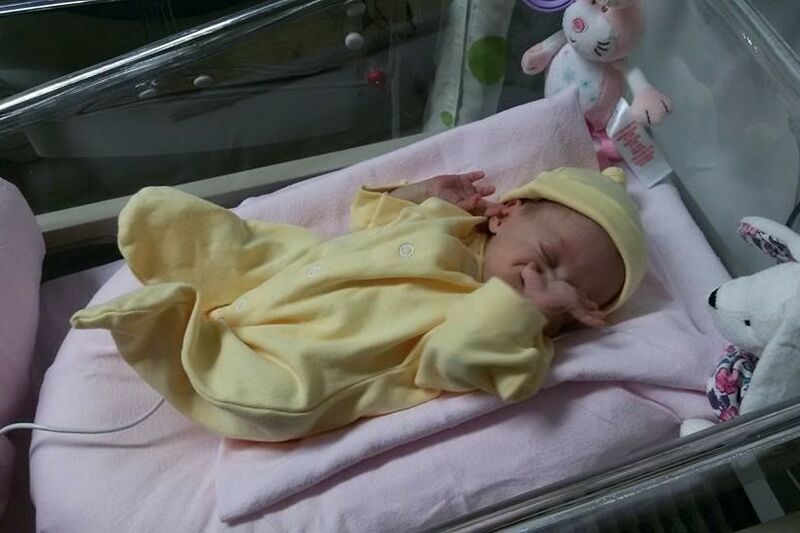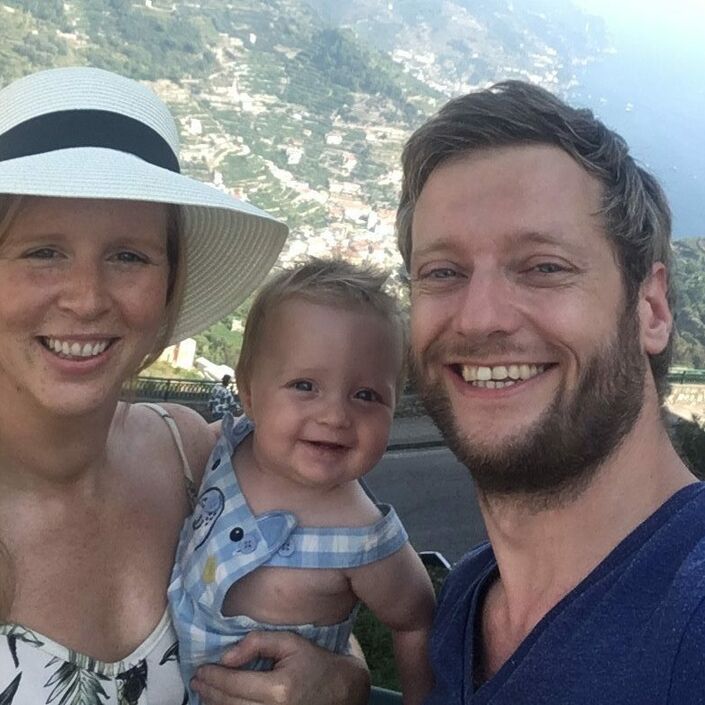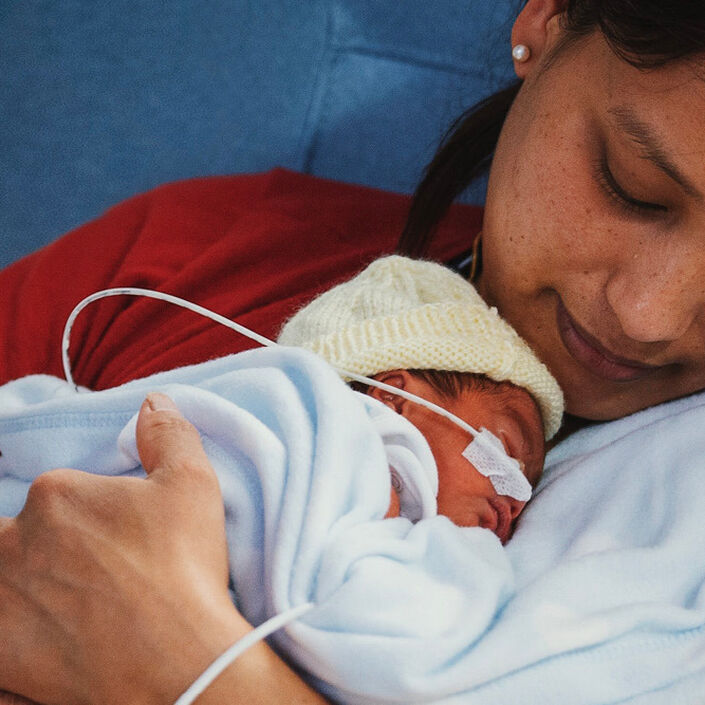My daughter Holly was born in 2014 at 30+6 weeks via emergency c-section. At the time, my husband, three-year-old daughter and I were living in Cyprus on a British military base because my husband is serving in the RAF.
During my routine prenatal checks my midwife discovered I was showing signs of developing pre-eclampsia because of protein in my urine and raised blood pressure. I began to have regular monitoring and after three consecutive checks which revealed my symptoms had worsened, immediately my midwife transferred me to hospital by ambulance.
Once there, I was given steroid injections to mature my baby’s lungs and admitted under close observation. Two days later, my condition worsened further and I was taken to theatre for an emergency c-section.
I lay there for what felt like an eternity, shaking with fear and desperately fighting the urge to pull everything off me and run away. The doctors pinched and then pressed frozen saline to my stomach and asked me if I could feel it. I cried out that I could feel everything and began panicking in case they started the operation before the anaesthetic kicked in. It was an emergency situation so time was important and they decided they couldn’t wait so put me under for the surgery. I was terrified that I wouldn’t wake up.
Holly was born weighing 3lb 3oz. She went straight onto a ventilator. When I came round, my husband, Andy, showed me photos he had taken but I was so groggy I didn’t really understand what was happening.
The next day, I was far more lucid and desperate to see my baby. The nurse spoke to the neonatal intensive care unit (NICU) to get me an update but I wasn’t allowed to see her until 12.00pm when the one-hour visiting slot began. Andy arrived and we anxiously watched the clock until it was time to go.

There were four babies in Holly’s room and it felt horrible walking into the room and not having a clue which one was mine. Andy led me to her and I couldn’t believe how perfect she was. She was so small but absolutely flawless. She had a scary amount of wires and tubes attached to her and we were only allowed to put our hands in the incubator and touch her tiny fingers.
The hour passed so quickly and when I returned to my bed I felt lost. I could hear the newborns on my ward crying and it was so difficult not to be with my baby. I was advised that although Holly was not able to have milk yet, she would eventually be able to take breast milk and I should start expressing.
I was taken to a nursery where the nurses brought the babies to care for them while the mothers rested and where they kept the breast pumps. My milk had not come in yet and expressing was a difficult experience. While I was trying, a new mother came in and began to breastfeed her baby. It was too much and I left in tears.
I asked Andy to bring in my own breast pump from home and began pumping at my bed. I took milk down to the NICU every day for Holly even though it was too early for her to have it but I wanted to make sure some would be on standby.

When I was discharged, the military provided us with a welfare house on the nearby UN base so that we could be close to the hospital. To begin with, we were so optimistic about having a short NICU stay because I read that most babies at her gestation come home after four or five weeks. Our British midwife told us that that was unlikely and that she would most likely be in NICU until close to her due date. The midwife was right and Holly came home after almost nine weeks.
The NICU experience was emotionally draining and I can’t help feeling it would have been easier to handle if we had been in the UK. Visiting hours amounted to two hours a day and sometimes less if there was a new baby being admitted into your baby’s room. On one occasion, we were only allowed to see her for less than 10 minutes.
Our family flew out to visit and welfare officers provided by the military would also come to see us but when we were on our own, one of us would have to stay outside with our three-year-old Sophie because she wasn’t allowed onto the unit. It was incredibly hard telling Sophie she couldn’t meet her sister yet but thankfully when Holly was in her first room, her incubator was near the viewing window so Sophie was allowed to peep in.
Communication between doctors and parents was extremely limited, and speaking with Cypriot families we knew it wasn’t just because of a language barrier. We would visit the doctors at every opportunity and mostly Holly seemed to improve a little bit and then have a setback. She had transfusions and treatments that we didn’t know about until after they’d taken place. She was ventilated for two weeks and then moved onto CPAP. The tapes hid her face and it was strange not really knowing what our daughter looked like.
When she was 20 days old we were finally, albeit briefly, allowed to hold her. We were told not to expect to again soon. It was around this point that we realised this was going to be an extremely long process and we began to settle into that mind set. We felt so helpless for so long, only able to stroke our baby through a hole in the incubator. I focused on expressing my milk, pumping regularly to maintain my supply and setting my alarm to pump at night. When she eventually began to take milk it was only 1ml every four hours or about a teaspoon a day.
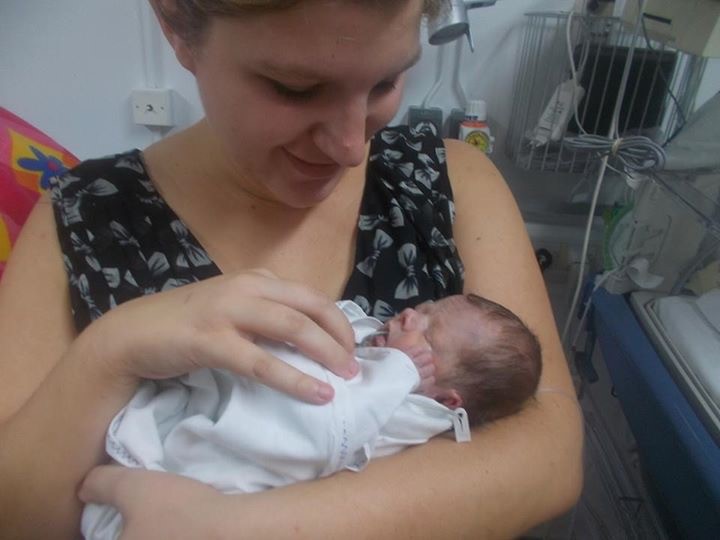
Eventually Holly was moved into a less high dependency room and I was allowed to do kangaroo care with her for an hour before each first daily visit. I adored this special extra time with her. I was beginning to feel more like a mum and bond with my baby. It wasn’t long before we were allowed to hold her at every visit and even attempted to feed her with expressed milk.

When she moved into one of the last rooms, we became excited knowing we were over the worst now and on our way to taking her home. When I walked in one day and saw her in a bassinet and in clothes rather than just a nappy in her incubator I broke down into happy tears. It was an amazing moment. From then we were allowed to dress, feed and change her and we loved every minute. By this point all we were waiting on was her reaching 2kg and it was an agonising slow wait.
We were on our way to the hospital when we finally got the call that we could take our baby home that day. We wouldn’t be able to take her until later on in the day so attending that last visiting hour was frustrating but when we left, knowing that was the last time we would walk out of that hospital without our baby, we felt incredible. Taking her home was amazing. We could finally take care of her properly and feel like proper parents to her. Her sister could finally hold her.
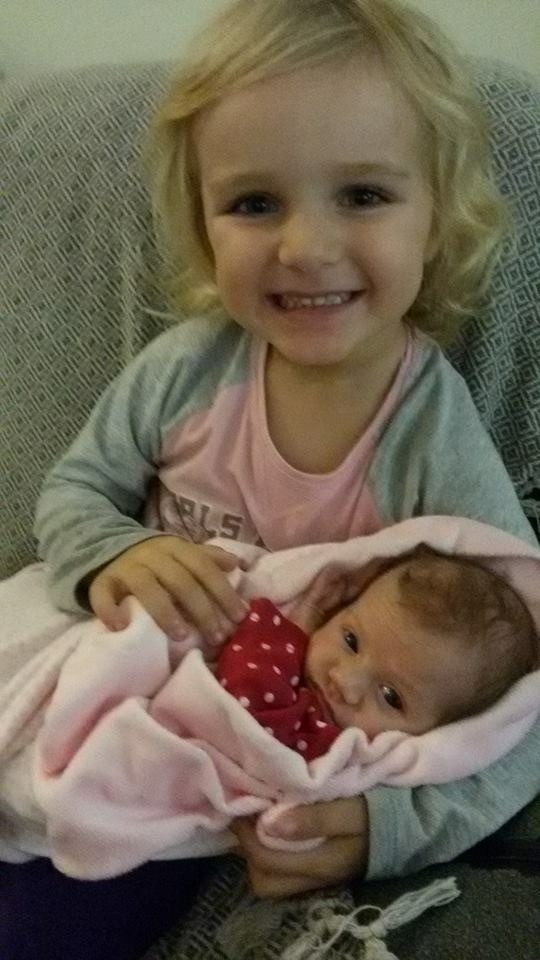
I will be forever grateful to everything the NICU staff did for our baby, we might have found their ways frustrating at times but ultimately they enabled us to take our healthy baby home.
This story was shared for World Prematurity Day, 17 November 2017
If you have been affected by any of the issues mentioned in this post and would like support, view our online support pages.
